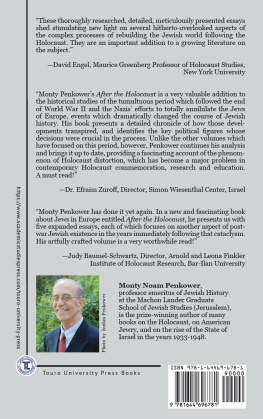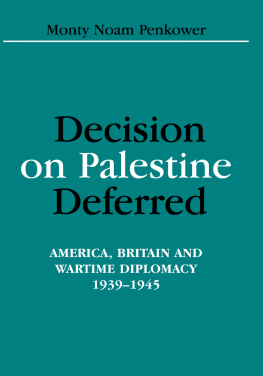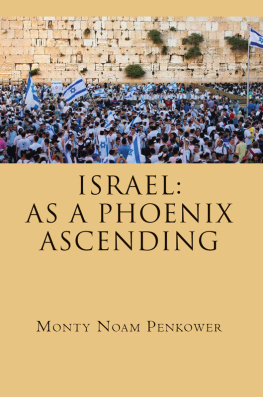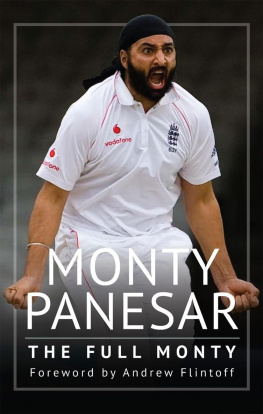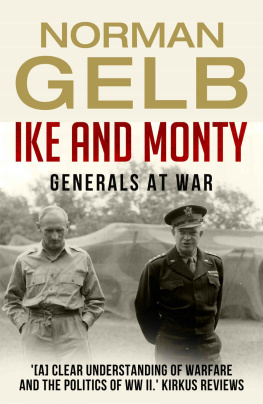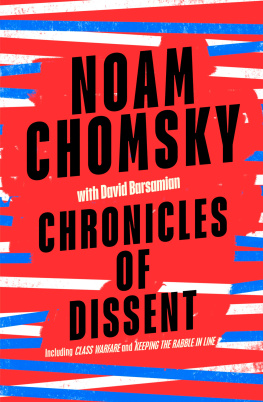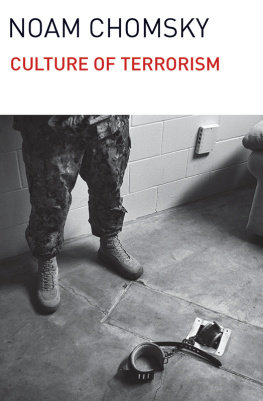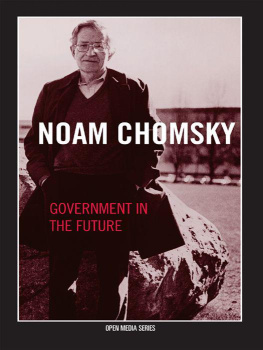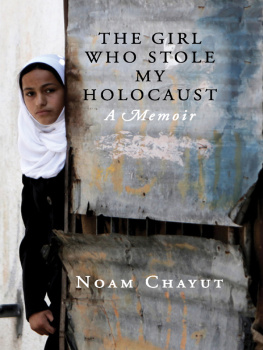Monty Noam Penkower - After the Holocaust
Here you can read online Monty Noam Penkower - After the Holocaust full text of the book (entire story) in english for free. Download pdf and epub, get meaning, cover and reviews about this ebook. year: 2021, publisher: Academic Studies, genre: Politics. Description of the work, (preface) as well as reviews are available. Best literature library LitArk.com created for fans of good reading and offers a wide selection of genres:
Romance novel
Science fiction
Adventure
Detective
Science
History
Home and family
Prose
Art
Politics
Computer
Non-fiction
Religion
Business
Children
Humor
Choose a favorite category and find really read worthwhile books. Enjoy immersion in the world of imagination, feel the emotions of the characters or learn something new for yourself, make an fascinating discovery.
- Book:After the Holocaust
- Author:
- Publisher:Academic Studies
- Genre:
- Year:2021
- Rating:4 / 5
- Favourites:Add to favourites
- Your mark:
- 80
- 1
- 2
- 3
- 4
- 5
After the Holocaust: summary, description and annotation
We offer to read an annotation, description, summary or preface (depends on what the author of the book "After the Holocaust" wrote himself). If you haven't found the necessary information about the book — write in the comments, we will try to find it.
After the Holocaust — read online for free the complete book (whole text) full work
Below is the text of the book, divided by pages. System saving the place of the last page read, allows you to conveniently read the book "After the Holocaust" online for free, without having to search again every time where you left off. Put a bookmark, and you can go to the page where you finished reading at any time.
Font size:
Interval:
Bookmark:

AFTER THE
HOLOCAUST
Touro University Press Books
Series Editor
MICHAEL A. SHMIDMAN, PhD (Touro College, New York)
SIMCHA FISHBANE, PhD (Touro College, New York)

AFTER THE
HOLOCAUST
MONTY NOAM PENKOWER
NEW YORK
2021
Library of Congress Cataloging-in-Publication Data
Names: Penkower, Monty Noam, 1942- author.
Title: After the Holocaust / Monty Noam Penkower.
Description: New York : Touro University Press, 2021. | Includes bibliographical references and index.
Identifiers: LCCN 2021016860 (print) | LCCN 2021016861 (ebook) | ISBN 9781644696781 (hardback) | ISBN 9781644696798 (paperback) | ISBN 9781644696804 (adobe pdf) | ISBN 9781644696811 (epub)
Subjects: LCSH: Holocaust, Jewish (1939-1945)--Influence. | World War, 1939-1945--Refugees. | Harrison, Earl Grant, 1899-1955. | Holocaust survivors--Violence against--Germany. | Holocaust, Jewish (1939-1945), and the arts. | United States--Emigration and immigration--Government policy.
Classification: LCC D804.3 .P457 2021 (print) | LCC D804.3 (ebook) | DDC 940.53/1814--dc23
LC record available at https://lccn.loc.gov/2021016860
LC ebook record available at https://lccn.loc.gov/2021016861
Copyright Touro University Press, 2021
Published by Touro University Press and Academic Studies Press.
Typeset, printed and distributed by Academic Studies Press.
ISBN 9781644696781 (hardback)
ISBN 9781644696798 (paperback)
ISBN 9781644696804 (adobe pdf)
ISBN 9781644696811 (epub)
Touro University Press
Michael A. Shmidman and Simcha Fishbane, Editors
320 West 31st Street, Fourth Floor,
New York, NY 10001, USA
tcpress@ touro.edu
Book design by Kryon Publishing Services.
On the cover: Jewish children on January 27, 1945, when soldiers of the Red Army reached Auschwitz.
Cover design by Ivan Grave.
Photo on the cover: Monument to the Ghetto Heroes in Yad-Vashem Museum, Jerusalem, Israel; sculpture by Nathan Rapoport.
Academic Studies Press
1577 Beacon Street
Brookline, MA 02446, USA
press@ academicstudiespress.com
www.academicstudiespress.com
To My Exemplary Teachers
The mind of the wise man makes his speech effective
And increases the wisdom on his lips.
( Proverbs 16:23)
Contents
Preface
In the autumn of 1940, the German philosopher and cultural critic Walter Benjamin found himself in the Catalan seaside town of Portbou. Fleeing southern France, where collaborationist Vichy government officials were handing over Jews to the Gestapo, the stateless Jew had crossed the Pyrenees with some fellow refugees to Spain. From there Benjamin hoped to reach Lisbon, where he could sail to New York City and be installed in an apartment set up for him by his already exiled colleagues from the Frankfurt School. However, a police official on the Spanish side declared when they arrived on the evening of September 26 that the border had been closed and that, without French exit papers, they would be returned to the French the next day. Fearing capture by the Gestapo, Benjamin took his life that night with an overdose of morphine pills; the other refugees were promptly allowed into Spain.
Left behind in the hands of his friend and political theorist Hannah Arendt was Benjamins last major work, written in the spring of that year in Paris after he had been released from two months in an internment camp near Nevers, France. Entitled On the Concept of History, the essay is often referred to as Theses on the Philosophy of History. Composed of twenty numbered paragraphs, this critique of historicism and most notably Marxist historical materialism rejected the past as a continuum of progress. Benjamins alternate vision of the past and progress employs Paul Klees Angelus Novus (1920), an oil transfer with watercolor which he had purchased in Munich in 1921 for 1,000 marks. The philosophers perspective, offered in thesis IX, sees the angel of history with his back turned to the future.
The eternally hovering angel, with hair that looks like paper scrolls, aerodynamically hopeless wings, and googly if rather melancholy eyes, looks as though he is about to move away from something he is fixedly
The storm that engulfed Benjamins fellow Jews across Europes soil in World War II, the one single catastrophe that in time would be called the Holocaust, could not have been foretold. While words like annihilation, destruction, extermination, starvation by death, elimination, physical extinction, shoah , and the onrush of lava surfaced with greater frequency in the depressing 1930s, no one could have forecast the time when Jewish hopes would be literally reduced to the anonymity of ashes. That unprecedented human tragedy, fueled by a racist Nazi ideology which zealously brooked no compromise, was simply inconceivable.
Before 1938, even the most pessimistic Zionists, who foresaw a complete end to Jews in Germany, planned for an orderly emigration to Palestine extending over a period of 1520 years, with no more than 20,00025,000 emigrants annually. Arthur Ruppin, the founder of Zionist settlement, spoke at the Evian Conference on Refugees that July of an annual emigration rate of 50,000 Jews from Germany and Austria over a six-year period. Revisionist-Zionist leader Vladimir (Zeev) Jabotinsky pressed in October 1938 for an immigration of 1,000,000 within three years, and blundered badly when deriding the Third Reich in May 1939 as an inflated balloon. Even the call of David Ben-Gurion, executive chairman of the Jewish Agency for Palestine, for an aliya rebellion without British approval after Kristallnacht, which he saw as the signal for the extermination of the Jewish people throughout the world, referred to the entry of 1,000,000 Jews in a short time.
Yet most Jews across Europe were trapped by nations which had bolted their doors, as the Evian Conference made crystal clear, while dictators obsessed with antisemitic onslaught would not allow the luxury of orderly, long-range mass resettlement. World Zionist Organization president Chaim Weizmanns public cri de coeur to Great Britains Palestine Royal Commission in November 1936, pointing to six million Jews living east of the Rhine doomed to be pent up in places where
The Jewish-Czech novelist Franz Kafka, whose The Trial was published in Prague in 1925, one year after his death, had cautioned of a time when innocent people would wake up one morning to discover that they were guilty of being themselves. Still, none could rationally predict that the accident of birth would doom European Jewry to systematic slaughter, aided by nations complicit in murder while the free world governments, standing by, relegated Hitlers primary victim to one category: expendable. The callousness exhibited, for example, by the Anglo-American alliance at the 1943 Bermuda Conference on Refugees to the one people marked for death in the global conflict found a similar response with the self-professed guardians of humanitarianism and morality like the International Red Cross and the Vatican, as well as with the neutral governments; Moscow ignored the entire matter. A few courageous Jewish souls, as well as Gentiles later designated by Israels Yad Vashem the Righteous among the Nations of the World, attempted to shatter the Allied conspiracy of silence and the prevailing illusion that nothing could be done, but their valiant race against calculated mass-production death wrested only limited successes.
Font size:
Interval:
Bookmark:
Similar books «After the Holocaust»
Look at similar books to After the Holocaust. We have selected literature similar in name and meaning in the hope of providing readers with more options to find new, interesting, not yet read works.
Discussion, reviews of the book After the Holocaust and just readers' own opinions. Leave your comments, write what you think about the work, its meaning or the main characters. Specify what exactly you liked and what you didn't like, and why you think so.

